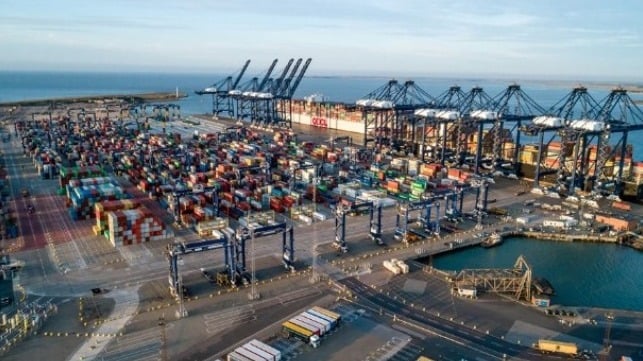British Ports are Scrambling as Brexit Deadline Looms Five Weeks Away

With just over five weeks left until the end of the Brexit transition period, fear is continuing to rise that the UK ports, terminals, and the services that support the operations are not ready. Increasingly there are predictions of the consequences ranging from delays and backlogs to disruptions and chaos for the vital flow of goods into and out of the UK, while the government continues to issue assurances.
According to the current timetable, on January 1, 2021, the first of the border controls are due to go into effect between the European Union and the UK. Operators around the UK report that critical tests on the systems required to manage the flow of goods have yet to be done leading to the fears that they will not be ready at the deadline.
BBC News is reporting that the tests for some of the systems are still two weeks away while they are reporting that the government says it is working closely with all parties to prepare for the end of the transition period. The BBC is quoting a government spokesperson as saying, "The delivery of IT systems necessary for the end of the transition period is on track."
Despite the assurances, many remain unconvinced that the ports and companies operating in the ports are prepared. The BBC reports that the Irish truckers’ association is the latest to predict upwards of six months of disruption based on where preparations stand today. They are citing the Holyhead port in Wales, which is the second busiest ro-ro port behind Dover. Despite assurances by the port’s operators, there are fears that the lack of preparation at Holyhead could disrupt the Irish short-sea trade for upwards of six months. The Irish Road Haulage Association the BBC and other media outlets report said the first six months of 2021 would be “terrible” due to the lack of preparations with fears of “mayhem.”
Predictions of the potential to interrupt the UK economy and industry are increasing. For example, they cite the automotive industry that functions on just-in-time delivery of parts necessary in production.
The UK’s busiest ports have already been scrambling to manage a rapid rise in cargo. With businesses seeking to restock and rebound from the earlier impacts of the pandemic, many ports are already experiencing heavy volumes. Adding to the challenges is a rush to get supplies across the borders before the deadline and new lockdowns due to efforts to control the latest wave of the virus.
The Port of Felixstowe, the UK’s biggest and busiest container port, has been especially challenged in recent weeks, leading many to call the situation unacceptable and forecasts that the port could become paralyzed. Compounding the problems are reports that the government stockpiled 11,000 containers of PPE supplies at the port. The port’s operator, Hutchison Ports, reports that it is working with the Government's principal forwarder to remove the PPE containers as quickly as possible. While they say that significant progress has been made in reducing the volumes, they nonetheless report it could be up to four more weeks before this impediment is cleared.
Hutchison also says that it is working with each shipping line to empty storage capacity. They warned that shipping lines that exceeded their empty storage capacity would face suspensions on the receipt of empties until the volume was lowered.
With the port fully operational, Hutchison says that more than 85,000 TEUs had moved through the port in one week. They have recruited more than 100 equipment drivers and opened the terminals on Sundays in an attempt to clear the backlogs. Despite this, some shipping lines report skipping scheduled port calls or adding congestion charges.

that matters most
Get the latest maritime news delivered to your inbox daily.
“The Port of Felixstowe, like other major container ports worldwide, is still experiencing a spike in container volumes and dealing with the consequences of the ongoing Covid pandemic. In addition, we have had a high number of slow moving containers of PPE occupying storage space,” said Hutchison in a statement posted to customers. “The current high volumes will last at least into December and possibly through into the New Year, but we are working hard to minimize the impact on daily operations and to maintain vital supply chains.
With the ports already struggling to manage the current volumes, fears are only growing over what might happen in January when the new systems are due to go into effect.
